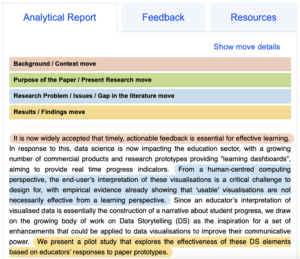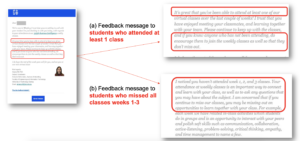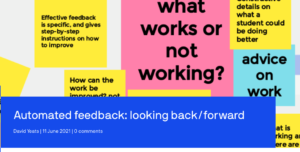Students need timely and personalised feedback to know how to improve, as well as to build a sense of belonging that fosters motivation. But how is this possible with large enrolment numbers and when all, or a significant amount, of learning is online?
Automated Feedback broadly refers to software’s ability to process data about student activity and convert this into feedback messages. There are many approaches to this, involving both learning analytics, and for more advanced analysis of the data, artificial intelligence (AI). Done well, this makes it possible to deliver feedback messages designed by the teaching team, but automatically compiled by machine, that are personalised to each student, at a speed, precision and scale that is humanly impossible, augmenting the teaching team’s overall capacity. No academic or tutor can give instant feedback to hundreds of students, 24/7: this is a niche for computers.
Raising awareness and building confidence: Last year we worked closely with our LX.Lab colleagues in the Institute for Interactive Media in Learning, to create a series of briefings introducing automated feedback tools to teaching teams across UTS. Here’s a great review of these sessions that they wrote, with links to all the replays. Academics then chose to attend more in-depth briefings on the tools that resonated most with them, with 1-1 support if they chose to embed them into their teaching.
Here are a couple of our most mature examples:
 AcaWriter is an innovative writing analytics tool was developed in-house at UTS. As the tool has evolved to its current state, more academics have introduced this writing feedback tool to their students as part of the curriculum, to enable them to get instant feedback on their written work, 24/7. To date, more than 8,000 students have used AcaWriter for instant feedback, with evaluations of these implementations indicating clearly that students appreciate the timeliness of the feedback as well as the benefits of being able to identify clearly where their draft needs to be improved.
AcaWriter is an innovative writing analytics tool was developed in-house at UTS. As the tool has evolved to its current state, more academics have introduced this writing feedback tool to their students as part of the curriculum, to enable them to get instant feedback on their written work, 24/7. To date, more than 8,000 students have used AcaWriter for instant feedback, with evaluations of these implementations indicating clearly that students appreciate the timeliness of the feedback as well as the benefits of being able to identify clearly where their draft needs to be improved.
- AcaWriter has been rigorously tested over the last 5 years by academics at UTS, where you can catch up with our latest work on building students’ automated feedback literacy, and assessing the depth of reflective writing
 OnTask enables educators to create rule-based messages for personalised feedback and support to their students, and to deliver these personalised messages as emails to all students in their subject. This learning analytics feedback tool serves a one-stop platform for academics, especially subject coordinators, to craft rule-based messages for tailored feedback and support to students, and to send these out as individual emails. Over 2021, CIC worked with subject coordinators to design OnTask feedback in their subjects, with the key consideration of making sure students received timely and tailored feedback information and support that they could act on, as well as to enhance feelings of belonging while learning remotely. More than 10,000 students at UTS received a personalised email via OnTask from their subject coordinators, offering tailored feedback and support according to their progress and needs.
OnTask enables educators to create rule-based messages for personalised feedback and support to their students, and to deliver these personalised messages as emails to all students in their subject. This learning analytics feedback tool serves a one-stop platform for academics, especially subject coordinators, to craft rule-based messages for tailored feedback and support to students, and to send these out as individual emails. Over 2021, CIC worked with subject coordinators to design OnTask feedback in their subjects, with the key consideration of making sure students received timely and tailored feedback information and support that they could act on, as well as to enhance feelings of belonging while learning remotely. More than 10,000 students at UTS received a personalised email via OnTask from their subject coordinators, offering tailored feedback and support according to their progress and needs.
- Learn more about the evidence underpinning OnTask which is being used in numerous universities spanning the U.S., South America, Australia and New Zealand
The theme for the recent UTS 2021 Teaching and Learning Forum, Putting Feedback for Learning into Practice, gave academics the opportunity to share their experiences with these automated feedback tools. After a brilliant keynote from leading feedback researcher Naomi Winstone, our academics shared the diverse ways in which they designed automated feedback into their subjects using these tools, and about the difference the personalised feedback and support made to their students’ learning and sense of belonging during a challenging time. During the forum, CIC also presented these tools to attendees in the form of demos and showcases.
- The UTS community can replay the presentations in the LTF21 Teams channel (Session 1 #3 Automated Feedback & Personalised Feedback and Session 2 #9 Automated Feedback and Feedback Literacy).
- Returning to the pioneering work by Naomi Winstone along with UTS Emeritus Professor David Boud, CIC has been analysing how the scholarship on feedback literacy can inform the skilful use of automated feedback tools: more on this coming soon! Meantime, you can replay the DAFFI 2020 talks from leading experts on feedback literacy and learning analytics.
